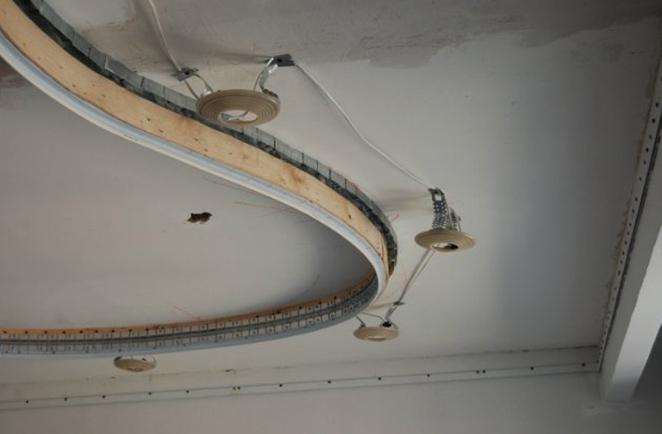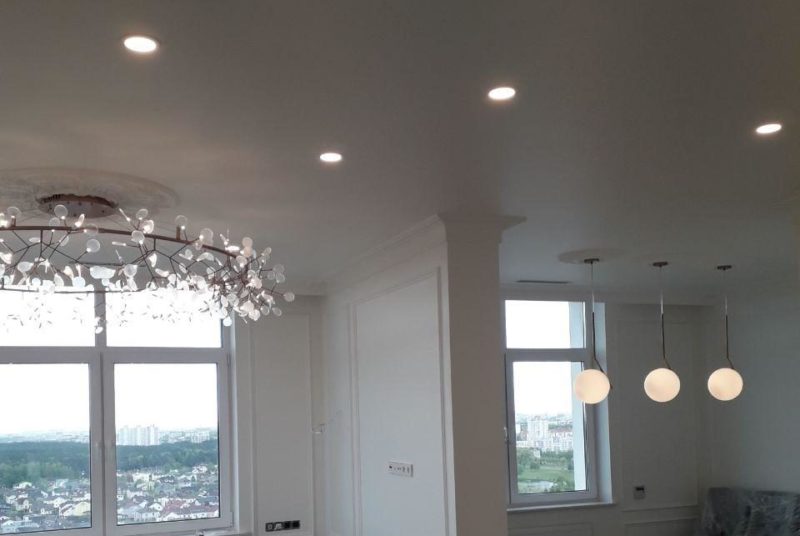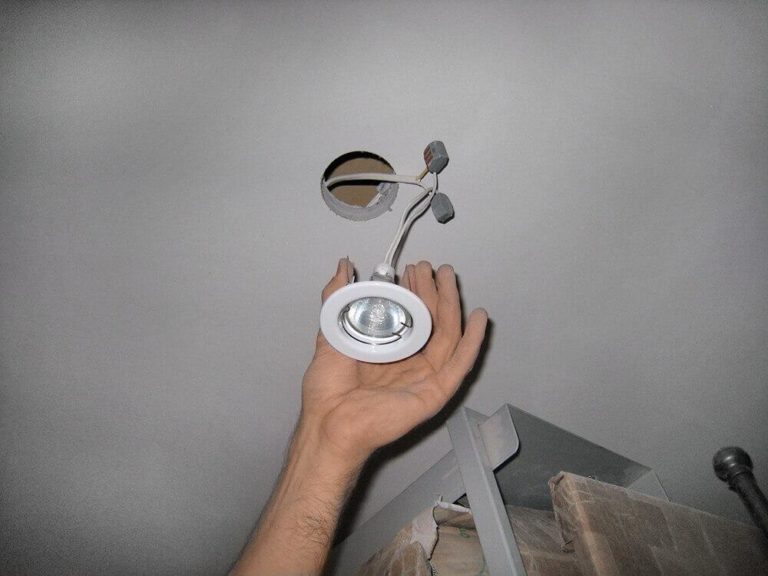Calculating the number of spotlights for stretch ceilings
To calculate the number of spotlights needed to comfortably illuminate a room, you need to consider several factors and follow a simple guideline. If you do not determine the optimal values, then the room will be either too dark or too light. Both are undesirable, as they affect the vision badly.
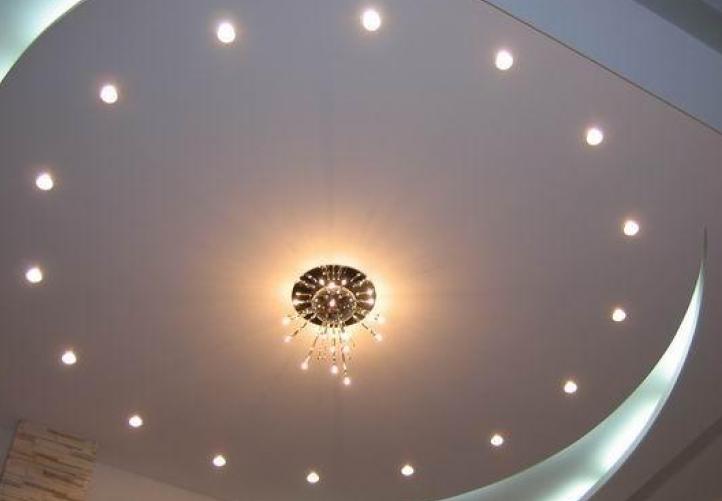
Calculating the number of spotlights
Everything depends on the size of the room, its purpose, ceiling height, finishing materials and other factors, so it is impossible to give a universal formula for all rooms. First you need to deal with the norms of illumination, which are set by SNIP, there are several options.
The easiest way to use the old rule, in force in the Soviet Union. According to it per square meter should be 20 watts of power when using incandescent bulbs (other types of lamps did not exist then).
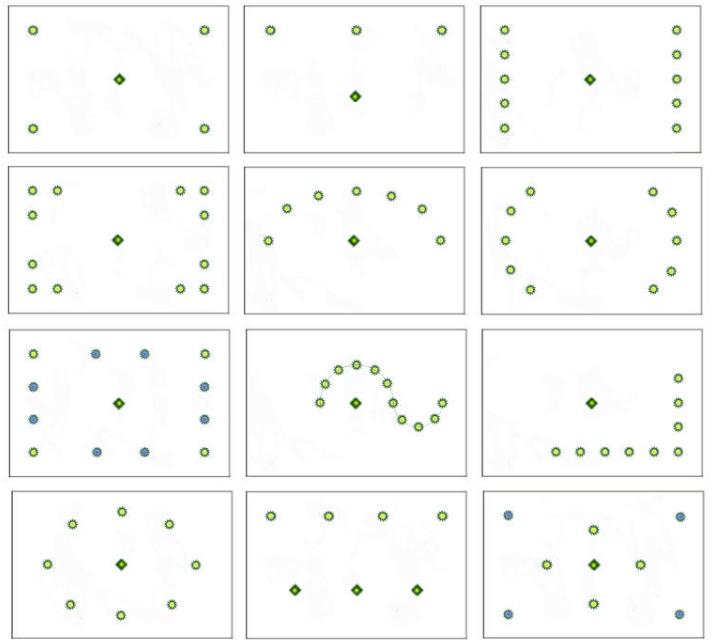
If you are guided by the power of the equipment, it is easier to find the right data from the table. It has all variants of light bulbs and established standards for them on the basis of watts per square meter.
| Incandescent bulb | Fluorescent bulb | Halogen bulb | LED bulb | |
|---|---|---|---|---|
| Children's | 60 | 20 | 75 | 8 |
| Bedroom | 15 | 5 | 16 | 2 |
| Living room and lounge | 22 | 8 | 27 | 3 |
| Corridor | 12 | 3 | 12 | 1 |
| Bathroom | 20 | 7 | 25 | 2 |
This is general information that is established for ceilings from 250 to 270 cm in height without taking into account the ceiling material, color finishes and other important factors. But even this is enough to have a general idea of what the total power of the lights should be for normal lighting of a particular room.
Manufacturers use lux (Lx) to indicate the level of illumination, which corresponds to the light flux of 1 Lumen (Lm) per square meter. That is, how much of the bulb's light is distributed over how much area. For example, if it has a power of 200 Lm and the light is directed to 1 square meter, the illuminance is 200 lux, and if the light is dispersed over 10 squares, the illuminance is 20 lux.
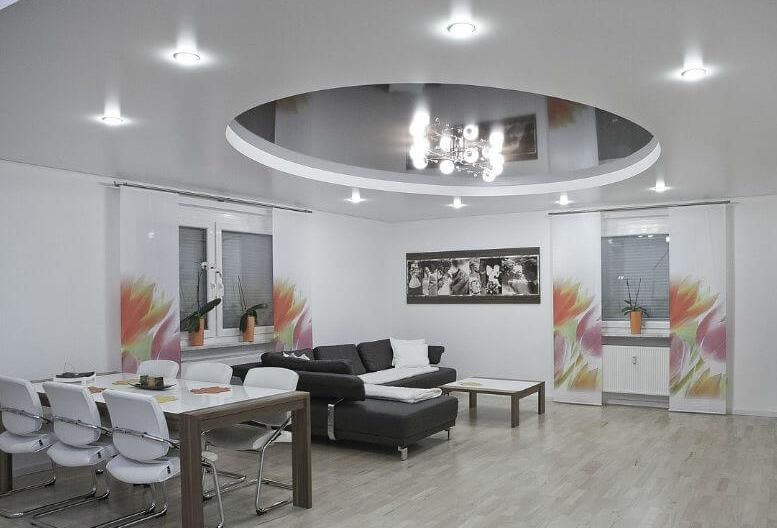
There are norms in lux for all types of rooms:
- Hall and living room - 150.
- Study - 300.
- Dining Room and Kitchen - 150.
- Children's room - 200.
- Corridor and hallway - 50.
- Bathroom - 50.
- Bedroom - 120.
- Bathroom - 250.
- Pantry - 60.
Most often the data on the light flux is on the packaging with the lamp or in the instructions for the lamp. If the information is not available, you can determine the wattage using the table.
| Type of lamp (wattage in W) | Luminous flux | ||||
| 220+ | 400+ | 700+ | 900+ | 1300+ | |
| Incandescent lamp | 25 | 40 | 60 | 75 | 100 |
| Halogen | 18 | 28 | 42 | 53 | 70 |
| Fluorescent | 6 | 9 | 12 | 15 | 20 |
| LED | 2,5 | 4 | 8 | 9 | 16 |
Important! In addition to power also matters the correct positioning of the luminairesThey must provide a uniform light.
You can also determine the wattage of the lamps using a calculator.
How to determine how many fixtures are needed for a particular room
Even using the basic information outlined above, you can calculate how many spotlights will be needed in a room. There are simple tips for this:
- Determine the area of the room by measuring the length and width.
- Use the table to determine the illumination rate per square meter. Multiply by the area to get an approximate result.
- Select the fixtures, and then divide the total number from the point above by the power of one element. If the value is fractional, it is better to round up.
- If there are several options with different power, it is worth using less powerful lights and put them more. Then the light will be more even and comfortable for the eyes.
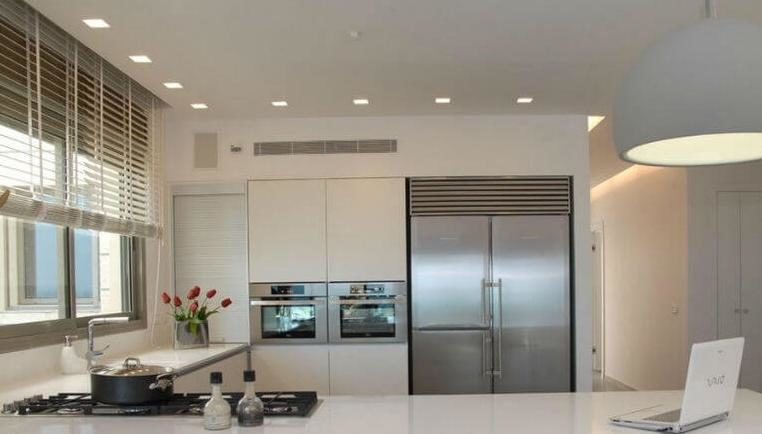
Calculating the number of bulbs per square meter
To find out the number of spotlights per square meter you can use formulas or automatically (online calculator). Both options are very easy, because you can substitute your own figures and get the result in seconds.
The formula
The formula looks like this:
N=(S+W)/P
Let's analyze each figure:
- N - the number of fixtures that will be needed for a particular room.
- S - the size of the room in square meters.
- W - power of the light flux, which is chosen according to the standards.
- P - power of one spotlight.
When calculating the need to take into account and such an indicator as the angle of illumination. Some spotlights take up little space, so it's better to choose models with a small power to place them closer to each other.
In principle, this is enough for home use, there is no point in using more complex options. But to get a more accurate result, it is necessary to take into account another aspect.
Be sure to consider the height of the ceiling in the room, the correction factor depends on this. If it is 250-270 cm, the result will remain the same. At a height of 270 to 3 m, you should increase the value by 20%. If the ceiling is from 3 to 3.5 m, you have to multiply the final number by 1.5, and if the height is very high - from 3.5 to 4.5 meters, the result is increased by 2 times.
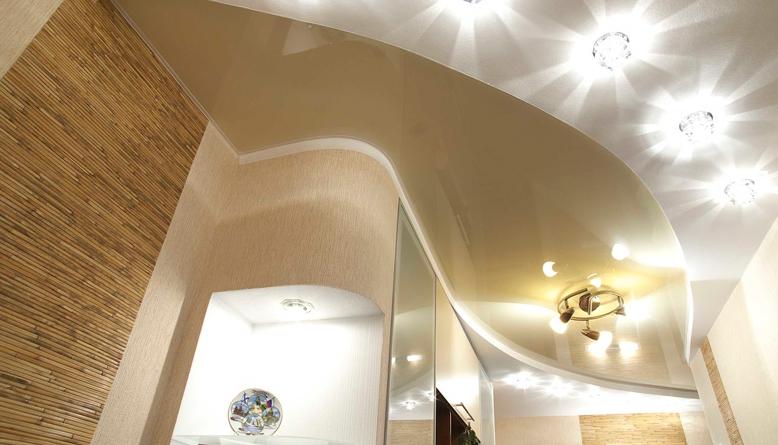
For the record! LED options have a light more close to natural, so it is best to use them.
Calculator
How to take into account surface reflection coefficient
Floor, ceiling, and wall finishes affect the degree of light because they reflect light differently. It depends on both the texture of the surface and its color. The overall performance of the decoration affects and very much, so you need to take this factor into account in the calculations.
The index, which characterizes the properties of a particular material is called the reflection coefficient. There are 5 main groups that are used in calculations:
- Black - 0%.
- Dark shades - 10%.
- Gray and close to it - 30%.
- Light and pastel tones 50%.
- White - 70%.
But these figures by themselves do not give anything. To calculate the average reflection coefficient, you must take into account the color of the floor, ceiling and walls. For example, the room has a dark floor, pastel wallpaper and a white ceiling. That is, you have to add 10%, 50% and 70% to get 130%. The result is divided by 3, you get about 43 or 0.43. The result obtained by the formula should be multiplied by the coefficient and you get an accurate figure, which should be used when selecting the number of fixtures.
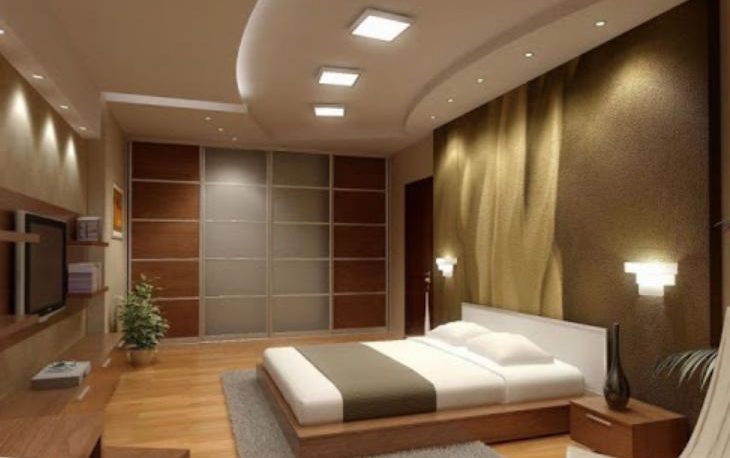
Features of the lighting of stretch ceilings
Calculation of the number of lights in a stretch ceiling should be carried out taking into account some peculiarities of this material. This is due to the fact that the characteristics of the canvas differ from traditional options. It is worth taking into account the following:
- Glossy surfaces reflect light much better than any other ceiling covering. This applies to both light and dark options. Fixtures on such bases provide excellent light quality, especially if competently placed.
- The canvas does not tolerate overheating, so it is better not to use incandescent lamps and halogen options. The minimum distance from the stretch ceiling to the slab when using these options should be 20 cm, which is not very good, because a lot of space is lost.
- Installation is also different, because the bases for spotlights are attached before the ceiling is laid. It is necessary to make a clear diagram and determine the location in advance, in order to lead the wires and fix platforms of the right size.
What lamps to choose, the nuances of combination
Stretch ceiling allows you to implement almost any idea, if everything is well prepared. It is necessary to take into account the following:
- It is best to use LED spotlights, do the calculations exactly for this option. Diodes are almost no heat when working, do not require a lot of space. The number of lights can be very large, but because of low electricity consumption, the wiring will not be overloaded.
- You can use both built-in models and overhead or semi-overhead models. They give glare on the surface, which looks original and serves to decorate the room.
- You can combine built-in models with a classic chandelier, which hangs in the middle. In this case, to calculate the number of spotlights need to subtract the power of the chandelier and take into account the area that it effectively illuminates.Option of combined lighting
- If track systems or sconces will be used, they should also be included in the calculations to determine the number of spot elements.
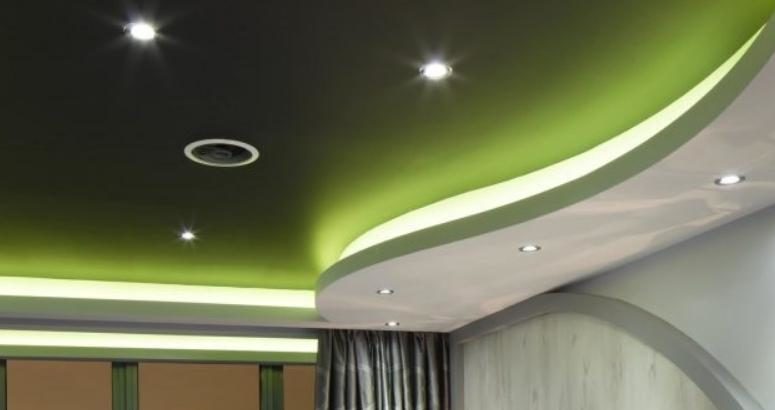
For information! If the perimeter will be installed backlighting, then it is worth considering it only if it scatters the light well and has sufficient power. Decorative options should not be taken into account.
When installing lights for 12 or 24 V, you must also install converters, under them you must choose a place in advance. Calculate the number by the total power of the bulbs, always choose a model with a reserve of at least 20%.
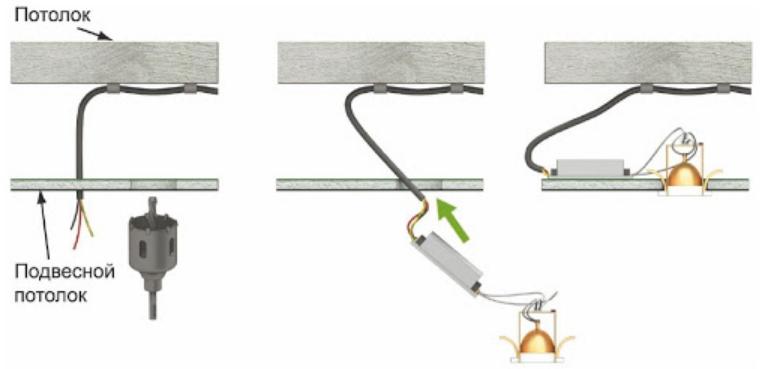
Topic video
Inaccuracies and errors in the calculation of LED lighting
When installing LED spotlights often make mistakes that affect the quality of lighting. To exclude them, it is worth considering a few recommendations when calculating:
- If you plan to update the finish of the walls or floor and the color will change, it is better to correct the reflection coefficient of the surfaces in advance. If you do not do this, then it may turn out that there is not enough light in the room, you will have to put more powerful fixtures, or increase their number.
- When only part of the lights are used, such as above the work area, arrange them so as to provide the right intensity of light in one place. If the equipment is evenly spaced, the illumination will not be sufficient to get the job done.
- If you buy inexpensive fixtures, it may turn out that their actual performance is lower than stated.
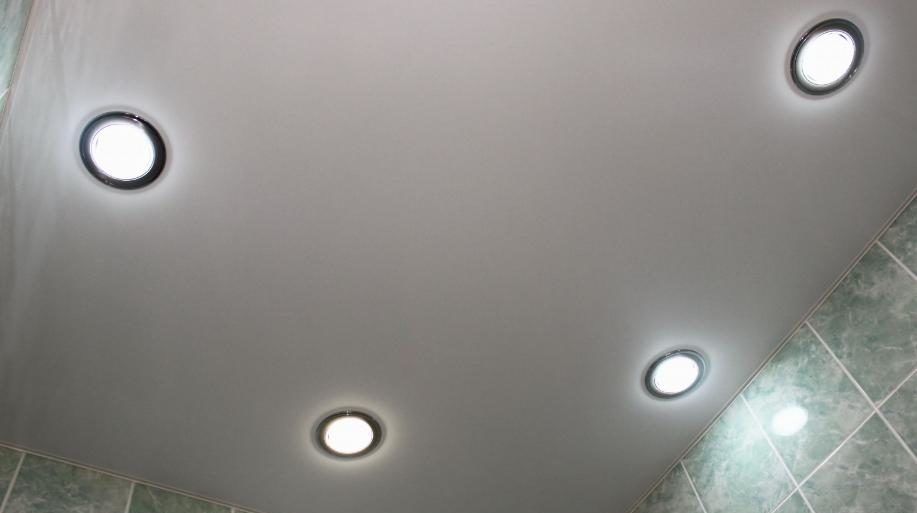
Calculate the number of spotlights is not difficult, if you know the rate of illumination for different rooms and use a simple formula. Do not lose sight of the reflection coefficient of the surfaces, it greatly affects the quality of light in the room.
